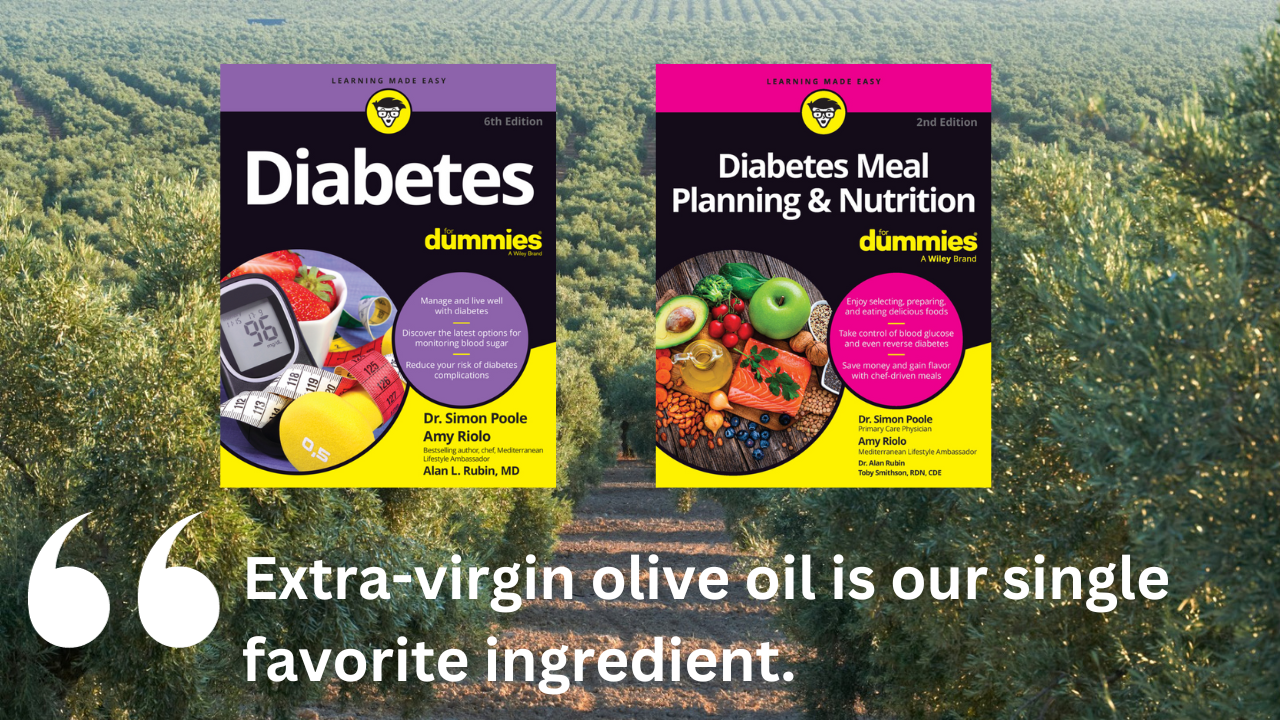As the leaves change colors and the air turns brisk, November ushers in not only the anticipation of winter but also an important period of reflection and action: Diabetes Awareness Month. This month is dedicated to increasing public understanding of diabetes, a condition that affects millions worldwide.
Olive oil, the cornerstone of the Mediterranean diet, is renowned for its flavor and numerous health benefits. Among its many virtues, olive oil has shown promise in preventing and managing both Type 1 and Type 2 diabetes and related conditions such as metabolic syndrome and polycystic ovarian syndrome. The Mediterranean Diet with olive oil has been shown in multiple peer-reviewed studies with human participants to improve outcomes with regard to body weight and blood-sugar control and measured by HBA1C.
The potential of olive oil to prevent and treat diabetes oil is described in the most recently published editions of Diabetes for Dummies and Diabetes Meal Planning & Nutrition. The Dummies series of books might have light-hearted titles, but they are well respected for making complex topics easier to understand. Writing team Dr. Simon Poole (physician) and Amy Riolo (chef) clearly believe in the power of extra virgin olive oil to help people with diabetes live their best lives. In fact, the authors list extra-virgin olive oil as their single favorite ingredient!
We asked authors Dr. Poole and Chef Riolo what makes them so passionate about olive oil, and here is how they responded:
Dr. Poole: "I was delighted to be asked to co-author these updated Dummies books because it provides the opportunity to bring a wide audience up to date not only with the latest developments in treatment, but perhaps more importantly to convey the message that it is possible in some circumstances to prevent or even reverse diabetes. Diet and lifestyle and especially the Mediterranean Diet, have been shown to be the gold standard approach because of its beneficial effects on diabetes itself and also mitigating risks of the chronic complications of diabetes. It has been very exciting to be able to introduce mainstream readers to bioactive compounds, including the polyphenols found in olive oil, which can have effects on glucose metabolism and insulin sensitivity - issues which are key to the management of diabetes."
Chef Riolo "I have seen firsthand the impact that following a Mediterranean diet and lifestyle can have on those dealing with diabetes. As someone who frequently lectures on the topic in both America and Italy, I am aware of both the challenges that people face, and the ways in which they can be transformed into positive experiences. It has been a true pleasure to collaborate with Dr. Simon Poole in writing these recent books and in other projects because his breadth of knowledge, experience and constant research consistently reveals ways in which patients can use nutrition to positively impact their health and life. With his findings, I am able to then create mouthwatering menus using the foods which are most beneficial to the wellness of those looking to prevent, manage, and transform diabetes. Good quality, high-phenolic olive oil is a staple that we recommend highly in all of our work."
The books focus heavily on lifestyle and nutritional interventions. Olive oil is mentioned 300 times in the two volumes in glowing terms. According to the Diabetes for Dummies book, the benefits of olive oil in relation to diabetes break into the following high-level categories:
- Inflammation: The book states that extra virgin olive oil works to reduce inflammation in our bodies, which is vital to diabetes patients who suffer from inflammation-related complications. In contrast, omega-6 polyunsaturated fats found in some vegetable and seed oils may promote harmful inflammation (page 153).
- Polyphenols: Extra virgin olive oil contains polyphenols, which are types of antioxidants shown to be beneficial to human health. The book discusses how polyphenols in foods can influence metabolic hormones such as GLP-1 and insulin (page 240).
- Glycemic load: Adding extra virgin olive oil to meals lowers the glycemic load of the food consumed (page 177).
- Increases insulin sensitivity: Olive oil is high in monounsaturated fats, which are known to enhance insulin sensitivity. These fats help reduce the inflammation that contributes to insulin resistance. By improving the efficiency of insulin in the body, cells can more effectively use glucose from the bloodstream, which is crucial in managing blood sugar levels.
- Cardiovascular health: Diabetes can't be looked at without also looking at heart disease and hypertension. Diabetics are more prone to cardiovascular issues. Extra virgin olive oil is well-documented with regard to cardiovascular health.
- Appetite: Even though fat contains three times the calories per gram than proteins or carbohydrates, it can increase satiety. Extra virgin olive oil can help you feel fuller for longer and enable you to eat smaller portions overall.
We recommend picking up a copy of Diabetes for Dummies and the companion Diabetes Meal Planning & Nutrition. The pair of books will set you up for success with easy-to-follow recipes, meal plans, and other recommendations to help prevent and manage both Type 1 and Type 2 diabetes. The eating plan and recipes in the books are excellent for people with diabetes to optimize carbohydrate and glucose metabolism but are also helpful for people concerned with conditions such as polycystic ovarian syndrome, metabolic syndrome, or obesity and their family members.





